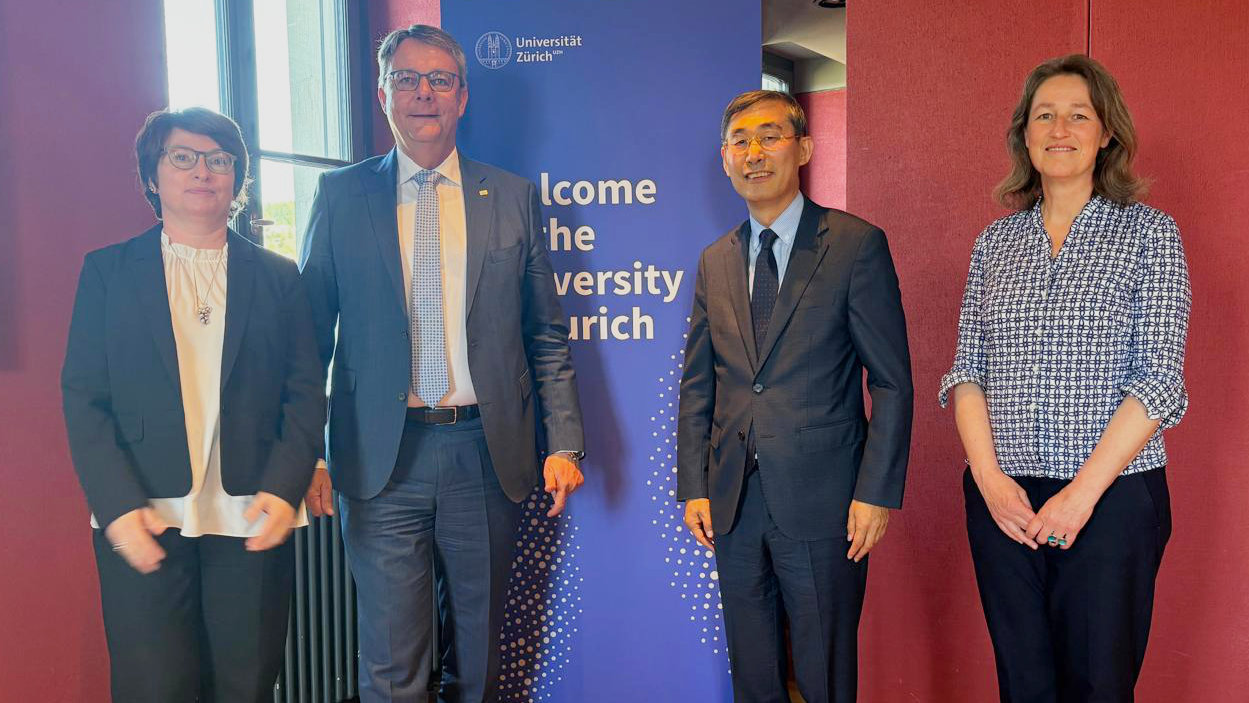Riding the Korean Wave: Korean Ambassador Visits UZH

The Ambassador of the Republic of Korea to Switzerland Chang-rok Keum visited the University of Zurich (UZH) for an informal lunch meeting with UZH President Michael Schaepman and faculty members engaged in Korea-related research. Set against the scenic backdrop of the city of Zurich, the gathering at the uniTurm restaurant provided a welcomed opportunity to exchange ideas and discuss shared interests. Discussions focused on expanding joint cooperation in key areas such as digitalization, life sciences, environmental sciences, and beyond.
Both sides also stressed the importance of enhancing “Korea competence” in Switzerland by advocating for more opportunities to deepen knowledge and expertise related to Korean society, language, culture, and innovation. This reflects a broader trend, as interest in Korean studies and culture continues to rise internationally.
Korea and Switzerland, which celebrated their 60-year anniversary of diplomatic relations in 2023, look back at longstanding and robust relations, including in the fields of science and technology. Between 2019 and 2024 alone, Swiss and Korean researchers produced over 6,000 joint scientific publications. Nearly one-quarter of these – almost 1,400 – were co-authored with researchers from UZH. This highlights the key role UZH plays in academic collaboration with Korea. In addition to several faculty- and institute-level agreements, UZH has also partnered with one of Korea’s leading research universities, Korea University, through joint membership in the global Universitas 21 (U21) network.
Moreover, UZH researchers have played an active role in recent years by contributing to the Swiss–Korean Innovation Week and the Swiss Korean Life Science Week. These events are organized annually by the Swiss Embassy in Seoul, further strengthening academic links between the two countries.
Growing interest and offering in Korean Studies reflects a global trend
Bolstered by the global rise of the so-called “Korean Wave” (or Hallyu in Korean), Korean culture, design, and entertainment have achieved significant international influence and popularity – a trend now increasingly visible in academic settings as well. This surge in global interest is reflected at UZH, where student demand for Korea-related topics continues to grow.
For example, Korean art and visual culture feature prominently in the teaching and research activities of UZH’s Department of Art History. Since 2023, Professor Ewa Machotka, holder of the Chair in East Asian Art History, has offered a broad range of courses on Korean art at all study levels. These include the foundational course Introduction to Korean Art History, which is taught every fourth semester, along with electives that explore Korean art within wider East Asian and global contexts.
Notably, this semester, students are engaging with contemporary Korean culture through a colloquium linked to the exhibition “Hallyu! The Korean Wave” at the Museum Rietberg in Zurich, on display until August 2025. Moreover, in the fall semester, the department will organize a public lecture series titled “The Art of Soft Power: New Perspectives on Korean Art and Culture”.
A strong partnership
Korea’s strong investment in research and innovation paired with a high degree of academic freedom has made it an increasingly important partner for Swiss innovation, research, and education institutions.
With its new mandate as Leading House Asia Pacific – awarded by the State Secretariat for Education, Research and Innovation (SERI) – UZH will help shape Switzerland’s engagement with this diverse and dynamic region, both in innovation and academia. Beginning this fall, the Leading House will offer funding opportunities across 15 Asia-Pacific countries, including Korea, to support Swiss researchers, students, and entrepreneurs in advancing international collaboration and exchange.
Raphael Kunz

